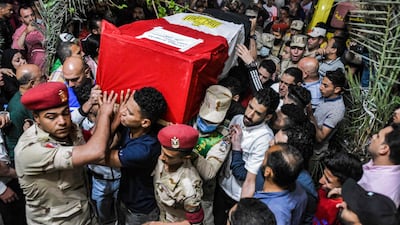An ISIS affiliate has claimed responsibility for an attack on a water plant in Egypt's Sinai Peninsula that killed 11 Egyptian soldiers, including one officer.
The attack on Saturday in a Sinai area just east of the Suez Canal was the deadliest against Egyptian security forces in years. At least five other soldiers were wounded in the attack, according to the military.
The local ISIS affiliate claimed responsibility in a statement carried by its Amaq news agency. The statement's authenticity could not be independently verified, but its wording conforms with previous announcements by the extremist group.
The military said on Saturday that troops were pursuing the attackers in an isolated area of the Sinai Peninsula, but there has been no word since on whether the assailants have been killed or captured.
The attack has dominated the conversation on Egypt's television talk shows as families of the victims mourned their loved ones in funerals attended by thousands across much of the nation.
It has also rallied Egyptians behind the government and the army in a show of unity, with social media platforms filled with messages of support, condolences and strong condemnations of terrorism.
“The attack was both shocking and surprising to many people. That's because we have kind of forgotten about that [terrorism],” said Amr Adeeb, the popular Egyptian host of the talk show El Hekayah, or 'the story,' on the Saudi-owned network MBC.
“But terrorism does not die and that's a fact, but you can contain it and reduce its frequency.”
The attack also drew messages of solidarity and condolences from regional and international leaders.
On Monday, the new head of the US Central Command, Gen Michael E. Kurilla, added his country's "full solidarity" with Egypt in its counterterrorism efforts during a meeting with President Abdel Fattah El Sisi in Cairo.
"It (terrorims) is the shared and most dangerous threat that faces the area and threatens the security of the entire region," a statement from the Egyptian leader's media office quoted Gen Kurilla as saying.
The Central Command's area of responsibility stretches from the Middle East to the Horn of Africa and as far away in Asia as Pakistan and Afghanistan.
Egypt has been a close ally of the United States since the late 1970s, receiving billions of dollars' worth of economic and military aid over the years. The two nations are known to be closely co-ordinating on counterterrorism activity and sharing intelligence, a constant that has weathered the ups and downs of their relations.
Egypt has for years been battling an Al Qaeda and later ISIS-led insurgency in the Sinai peninsula. The insurgency there had intensified after the military in 2013 overthrew an elected but divisive president, Mohammed Morsi of the now-banned Muslim Brotherhood.
It targeted security forces and Christians in the Sinai, the mainland in Cairo and the Nile Delta, as well as remote areas of the western desert close to the Libyan border.
However, the frequency and deadliness of the attacks has dropped sharply since the government in 2018 launched a major offensive in northern Sinai, the epicentre of the insurgency. The offensive succeeded in dislodging the militants from most of their strongholds in the region close to the border with the Gaza Strip and Israel and secured the support of local tribesmen.
The offensive has involved troops and militarised police contingents backed by fighter jets, helicopter gunships, tanks and navy ships.
Saturday's attack took place just two weeks after President El Sisi said that more than 3,000 troops and policemen have been killed fighting militants since 2013, and at least 12,000 more have been injured.
Striking a confident note, he said the fight in northern Sinai has been settled and that his government would declare the end of terrorism when it cleared the region from explosives and roadside bombs.


